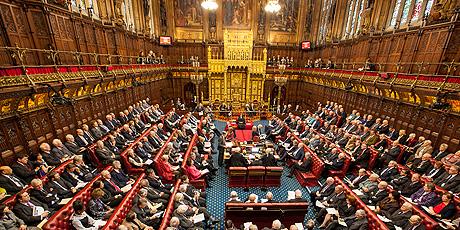
Common frameworks risk being a missed opportunity to strengthen the Union, say the House of Lords Common Frameworks Scrutiny Committee. As a result of Brexit, they were designed as an innovative and creative mechanism for strengthening cooperation and the coordination of fundamental policies such as environmental health, carbon emissions, building standards and transport within the Union of the UK. However, they are in danger of failing in this task.
In the committee’s second report on the common frameworks programme, published today, the committee highlights that the Government’s own post-Brexit legislation has damaged relations between the four administrations of the UK and challenges the success of common frameworks, and that the programme could become a serious casualty of political fall-out in Northern Ireland. It also raises significant concern in relation to the delivery of the programme within Government, highlighting ineffective central coordination, focus, and poor attention to detail.
The committee also regrets that common frameworks mainly contain processes to agree ways of working between the administrations, and that the creative opportunity for agreeing policy direction across the four administrations has not been fully appreciated.
Despite these concerns, the committee reiterates the conclusion from its first report that common frameworks have unique and singular potential to enrich and strengthen the Union and that that opportunity can still be retrieved.
Post-Brexit legislation
Specifically, the report notes that post-Brexit legislation, including the UK Internal Market Act 2020 and the Subsidy Control Act 2022 has damaged relations between the four administrations and has challenged the consensus approach taken in common frameworks.
The committee is calling for the exclusions process, which is essential for mitigating the effects of the Internal Market Act, to be made explicit in all relevant frameworks.
The Subsidy Control Act 2022 challenged the principle of common frameworks of increasing decision-making powers in devolved administrations, by restricting their freedom to act within their own areas of competence. This threatens the successful operation of relevant common frameworks as mechanisms for coordinating UK wide policy by consensus. The report recommends that the UK Government considers how legislation it brings forward might conflict with relevant common frameworks, impede their successful operation, and affect the health of the Union.
Northern Ireland
Common frameworks are intended to facilitate the cooperation of all four administrations, and the lack of an Executive in Northern Ireland has meant this has not always been possible, the committee highlights.
The report recommends that, as part of the regular reviews on the ongoing functioning of frameworks, all frameworks that interact with the Protocol are reviewed in order to assess their ability to cope with divergence. The results of these exercises should be published in planned regular updates on the ongoing functioning of frameworks.
Furthermore, it is essential that the Northern Ireland Executive and Assembly are kept updated on legislation that will apply there – and that all frameworks that have cross-border implications on the island of Ireland should acknowledge that the Irish Government is a stakeholder that should be consulted.
Programme delivery and transparency
During its scrutiny, the committee was also concerned about delays to the common framework programme’s timetable, the lack of quality, and the efficacy of delivery – identifying ineffective central coordination, focus, and attention to detail, which has led to inconsistency between frameworks and poor drafting. In addition, there has also been a lack of transparency in relation to their development and future operation, and stakeholder consultation has been insufficient.
Ministerial oversight of the programme has also been moved away from the Cabinet Office to the Department for Levelling Up, Housing and Communities (DLUHC), which threatens to undermine the profile, credibility and central purpose of the programme. The committee has recommended that the programme should be centrally coordinated solely from the Cabinet Office.
Baroness Andrews, Chair of the House of Lords Common Frameworks Scrutiny Committee said:
“Common frameworks, as consensus-based agreements principled by an acknowledgement of mutual respect, offer a unique opportunity to set the model for strengthening the Union and they must be taken seriously.
“What is alarming is that many of the frameworks that we have scrutinised have failed to reach an acceptable standard which reflects, we believe, a lack of focus, commitment and will in Government to give them priority. In addition, we regret that the failure of the Government to meet its own timetable has meant that our scrutiny of common frameworks is incomplete. We also have deep concerns that the Government’s own post-Brexit legislation threatens to diminish the potential of the Common Frameworks and their purpose.
“There will be a continuing need for Parliament to be informed about the progress of the frameworks, their quality, efficacy and role in relation to the Union. Accountability to Parliament is of key and fundamental importance and we recommend that the process for ongoing reporting to the legislatures on the operation of common frameworks be developed as a matter of urgency.
“Importantly, cooperation will be undermined without Northern Ireland’s full participation. It is our hope that all political institutions will be restored in Northern Ireland imminently.
“The continued failure of the Government to meet its own timetable reflects the reality that it underestimated the collaboration and coordination required to agree effective common frameworks. We urge that a solution be found to publish and finalise the six outstanding frameworks while there is no properly functioning Northern Ireland Executive – and to make this a priority so that common frameworks can do the job for which they were intended: to enable the Union to function in harmony with the appropriate divergence reflected in the devolution settlement.”

| [donate]
| Help keep news FREE for our readersSupporting your local community newspaper/online news outlet is crucial now more than ever. If you believe in independent journalism,then consider making a valuable contribution by making a one-time or monthly donation. We operate in rural areas where providing unbiased news can be challenging. |



















